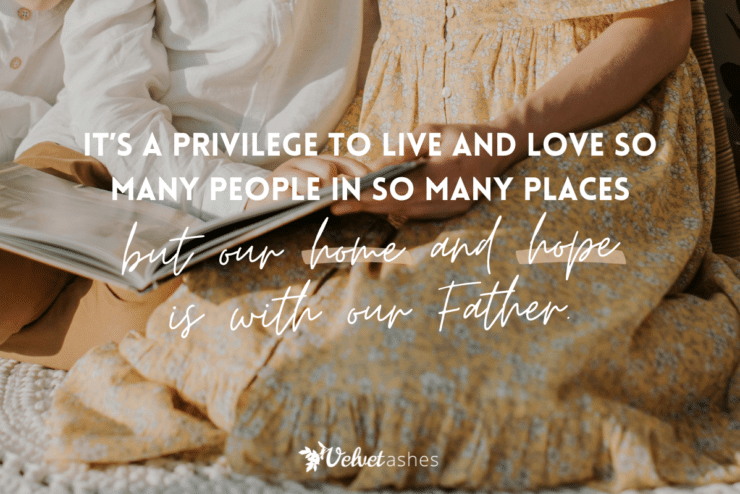Okay, so I ended last book club’s post with this joke: P.S. Next bird? The Ostrich. Anyone else feel like hiding their head? Get it :-)? A bird joke!
Turns out the joke is on me. According to Consider the Birds by
Now I want to stick my head in the sand! Actually, this interaction made me think of another book, Made to Stick by Dan and Chip Heath. They explore what makes some ideas sticky—like ostriches sticking their heads in the sand, even if inaccurate—and other ideas easy to forget.
I enjoyed how Debbie played around with tragedy. “Wrinkles are not tragic.” How often we confuse what is truly tragic with what is comically tragic, thus training our souls to be confused as to what tragedy really is. I had not heard Job approached as being part comedy. Because of how unjustly (to him and I can’t say I disagree!) Job had been treated by God and then later by his friends, more often this book is turned to in times of tragedy. I’ve had more than one friend use it as a way to verbalize to God how they felt in a tragic situation when they were not able to pray anything else.
I do not think this is “wrong”—how can honest crying out to God be wrong? But I see Debbie’s point that Job and his friends were a bit consumed by righteousness and God seemed to change the conversation to be about animals. And in his turning, he distracts Job from his ranting and allows him to catch his breath and gather himself.
It is as if God sees how Job has spun himself out of control and almost can’t refocus, so God in essence says, “Let’s look over here at this other thing.” I did it the other day with a niece who was on the path to major meltdown. I pretended I didn’t notice (nothing worse than someone pointing out how unreasonable we are being, am I right?), and showed her how to use a selfie-stick. She loves technology so I thought I had a pretty good chance, and sure enough, meltdown averted, fun family outing restored.
This analogy puzzled me, though. It does seem God is diverting Job, and yet I also believe that we can come to God with anything. He is okay with our tantrums. I still stand with Job having legitimate reasons to lament and God does not poo-poo our hurts, But maybe, like a too tired child, his points were valid, his delivery was the problem.
I think Debbie is on to something with “God does not speak gloriously of the animals because they’re all focusing on God or because they have made God the center of their lives. God just seems to like them – to be enamored of them, whether or not they are paying attention to Him.
“This is a very different sort of stance than Job. The once greatest– man-who-ever-lived, takes. Everyone’s eyes used to be on him. The crowd parted when he walked through it. Job disdains the pathetic lives of the ‘unruly brood'” who are like animals to him. His fall from greatness is his great tragedy.
“God more or less ignores Job’s great drama in this particular bit of poetry – or perhaps models a different way of being . . . Maybe it is not meant to diminish us in some scornful way, but rather to diminish us in a way that sets us free. God is trying to give us a break—consider what is not you, what is beyond you.”
What a life-giving thought. God is trying to give us a break. He sees our hurt, our tragedies, and it is not that he finds them petty or not valid, instead, he is looking to give us relief in the midst of them.
Back to the ostrich him and herself. I adore the tag team parenting. “The female sits on the eggs during the day because her feathers match the sand. The male sits on them at night, because he is black and blends into the darkness.” What an example of the body at work and the bringing together of different gifts and characteristics for the good of the common goal, in this case, a hatched egg.
If you are doing the Bible study (found here), how does knowing that ostriches cry like “hoarse children” influence passages like Micah 1:8-9?
Debbie ended this chapter with the idea that though the process may be slow, God is loving creation into fully being. Sounds a bit like what we are in the business of doing too, eh?
See you in the comments!
Amy
P.S. Next up? The sparrow.





I loved her summary of what God was doing for Job. She said, or maybe Abby said, that God was showing Job, “Here is where you really live. You do not live in that narrow world you thought you occupied. That’s not real. That’s something you made up. Come out here and be free as you were meant to be.”
And… “the effect of God’s speeches is humbling.” Her point of “fearfully propping ourselves up… trying so hard to be somebody when we already are…” describes so much of our lives and the freedom we have because God already says we ARE.
I love that invitation too Jenilee :). “That’s not real, that’s something you made up. Come out here and be free as you were meant to be.”
I am still taken with the vulture, but this ostrich is tugging on my heart too :)!
I just laughed so hard at her beginning anecdote! Like, laughing out loud while I read it at the kitchen table. Those were funny stories and funny commentaries on society. I enjoyed this chapter more than the last couple chapters.
“It’s possible that Job overestimates his bigness, greatness, and centrality. People tend to do this.” True! Guilty as charged! And that thought makes God’s response to Job make a lot of sense.
I love the idea of God delighting in his own creation, even though most of it can’t actually worship God purposefully (although I think all creation brings glory to God). I just love that.
And again, she goes into mortality, our physical bodies. How we are bound by them. But I’m thinking, being bound by physical limits is probably a good thing for beings who tend to overestimate their bigness, greatness, and centrality.
I loved the bit about the ostrich, this giant flightless bird, surviving in a tough and savage place like Africa, when many gigantic flightless birds became extinct. That was just a fun little tidbit.
I found the section about reproduction quite interesting and even funny. Just imagine watching all that organized chaos.
I did quite like the part at the end where she’s saying what God was doing was taking the focus off Job and onto all the cool things God has made. That can be a good antidote to all sorts of mental dips and blocks.
And the part about us having big brains but not seeing the intelligence in these little-brained birds — ooh, good stuff right there. Just because we don’t understand something or see the value in it doesn’t mean it isn’t great or grand.
Yeah, like I said, I was digging this chapter 🙂
But I look forward to the sparrow — it’s part of some of my favorite sections of Scripture, so it will be interesting to see what she has to say.
I agree! Much to mull over — in reading this book it has struck me as kind of funny how in learning about birds (or, shall I say, considering birds) we are actually learning about (considering) ourselves and God. I find it delightful and profound :).